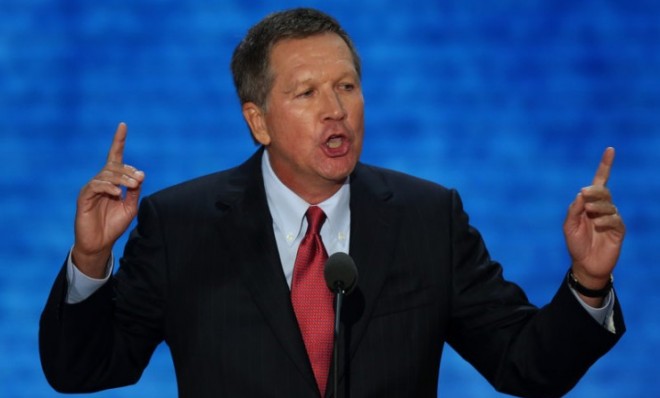Gov. John Kasich's Medicaid flip: Are conservatives embracing ObamaCare?
Why did the Tea Party–backed governor of Ohio just say yes to a key part of President Obama's health care law?


Ohio Gov. John Kasich (R) is the latest governor to accept the hefty Medicaid expansion authorized by President Obama's health care overhaul. He's not the first Republican to do so — Brian Sandoval (Nev.), Susana Martinez (N.M.), Jack Dalrymple (N.D.), and Jan Brewer (Ariz.) have, too — but Kasich's opt-in is a bigger deal. As House Budget Committee chairman during the Newt Gingrich years, the "fiercely conservative" Kasich "built his political identity arguing for smaller government," says David Nather at Politico. And the expansion of Medicaid to every Ohio resident earning up to roughly 133 percent of the poverty level is inarguably a big expansion of government — and an embrace of a key mechanism of ObamaCare. That is not going over well with Kasich's conservative and Tea Party supporters, since he was one of their best hopes to stop ObamaCare at the state level.
Kasich has been twisting himself into a pretzel trying to argue that Medicaid expansion isn't really ObamaCare.... But the fact remains that broader Medicaid coverage is a central piece of Obama's health care law, and thanks to the Supreme Court ruling last summer, states don't have to go along with it. Anti-ObamaCare groups have lost the argument with a few other red-state governors, but Kasich isn't just any red-state governor. He's been known as the most aggressive spending hawk this side of Scott Walker and Mitch Daniels. [Politico]
Not only has Kasich flipped on the Medicaid expansion, says Jason Sattler at The National Memo. He's also doing so by making the same "arguments that universal health care proponents have been making for decades: The uninsured cost us all." And with Kasich — whose "whole political stock in trade is being the ultimate conservative green eyeshade" — now touting ObamaCare's Medicaid deal as "a good fiscal deal for Ohio (as it is for all states)," says Ed Kilgore at Washington Monthly, it should force red-state nay-sayers "to stop hiding behind fiscal myths and just come out and admit they don't want their citizens to benefit from ObamaCare, full stop."
Kasich's welcoming of more Medicaid is "a huge victory for the White House that will provide cover for more Republican governors to do the same," says Phillip Klein at The Washington Examiner. But it's also a great "demonstration of how difficult it is to defeat big government." On one level, this is a great deal for Ohio — the federal government will pay for 100 percent of the new coverage for three years, then 90 percent. But "this comes at a cost to federal taxpayers — $932 billion over a decade," if all states participated.
The Week
Escape your echo chamber. Get the facts behind the news, plus analysis from multiple perspectives.

Sign up for The Week's Free Newsletters
From our morning news briefing to a weekly Good News Newsletter, get the best of The Week delivered directly to your inbox.
From our morning news briefing to a weekly Good News Newsletter, get the best of The Week delivered directly to your inbox.
Whatever justifications Kasich may give, the actual explanation for his embrace of the Medicaid expansion is political cowardice. Chastened by his failed attempt at public sector union reform and Obama's victory in the state, Kasich is up for re-election next year. And he's afraid to stand up to the inevitable onslaught of attacks from Democrats who would charge that he was refusing to accept free money to bring health care to poor Ohioans. The end result is that a politician who ran for office claiming to have been "in the Tea Party before there was a Tea Party" is now actively embracing a policy that the Tea Party movement was born to oppose. This should serve as a sober reminder to conservatives that no matter how big of a disaster ObamaCare is when it's implemented in 2014, the nation is almost certainly stuck with it. [Washington Examiner]
A free daily email with the biggest news stories of the day – and the best features from TheWeek.com
Peter has worked as a news and culture writer and editor at The Week since the site's launch in 2008. He covers politics, world affairs, religion and cultural currents. His journalism career began as a copy editor at a financial newswire and has included editorial positions at The New York Times Magazine, Facts on File, and Oregon State University.
-
 6 homes with incredible balconies
6 homes with incredible balconiesFeature Featuring a graceful terrace above the trees in Utah and a posh wraparound in New York City
-
 Did Alex Pretti’s killing open a GOP rift on guns?
Did Alex Pretti’s killing open a GOP rift on guns?Talking Points Second Amendment groups push back on the White House narrative
-
 The 8 best hospital dramas of all time
The 8 best hospital dramas of all timethe week recommends From wartime period pieces to of-the-moment procedurals, audiences never tire of watching doctors and nurses do their lifesaving thing
-
 The billionaires’ wealth tax: a catastrophe for California?
The billionaires’ wealth tax: a catastrophe for California?Talking Point Peter Thiel and Larry Page preparing to change state residency
-
 Bari Weiss’ ‘60 Minutes’ scandal is about more than one report
Bari Weiss’ ‘60 Minutes’ scandal is about more than one reportIN THE SPOTLIGHT By blocking an approved segment on a controversial prison holding US deportees in El Salvador, the editor-in-chief of CBS News has become the main story
-
 Has Zohran Mamdani shown the Democrats how to win again?
Has Zohran Mamdani shown the Democrats how to win again?Today’s Big Question New York City mayoral election touted as victory for left-wing populists but moderate centrist wins elsewhere present more complex path for Democratic Party
-
 Millions turn out for anti-Trump ‘No Kings’ rallies
Millions turn out for anti-Trump ‘No Kings’ ralliesSpeed Read An estimated 7 million people participated, 2 million more than at the first ‘No Kings’ protest in June
-
 Ghislaine Maxwell: angling for a Trump pardon
Ghislaine Maxwell: angling for a Trump pardonTalking Point Convicted sex trafficker's testimony could shed new light on president's links to Jeffrey Epstein
-
 The last words and final moments of 40 presidents
The last words and final moments of 40 presidentsThe Explainer Some are eloquent quotes worthy of the holders of the highest office in the nation, and others... aren't
-
 The JFK files: the truth at last?
The JFK files: the truth at last?In The Spotlight More than 64,000 previously classified documents relating the 1963 assassination of John F. Kennedy have been released by the Trump administration
-
 'Seriously, not literally': how should the world take Donald Trump?
'Seriously, not literally': how should the world take Donald Trump?Today's big question White House rhetoric and reality look likely to become increasingly blurred
